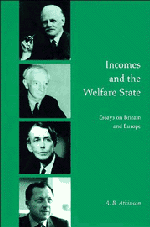Book contents
- Frontmatter
- Contents
- List of figures
- List of tables
- Preface
- Introduction
- I Income inequality and poverty in Britain and Europe
- II Analysis of the Welfare State
- III Targeting and the future of social security policy
- 12 On targeting and family benefits
- 13 The Western experience with social safety nets
- 14 Towards a European social safety net?
- 15 Beveridge, the national minimum and its future in a European context
- 16 State pensions for today and tomorrow
- Notes
- Bibliography
- Name index
- Subject index
16 - State pensions for today and tomorrow
Published online by Cambridge University Press: 03 May 2011
- Frontmatter
- Contents
- List of figures
- List of tables
- Preface
- Introduction
- I Income inequality and poverty in Britain and Europe
- II Analysis of the Welfare State
- III Targeting and the future of social security policy
- 12 On targeting and family benefits
- 13 The Western experience with social safety nets
- 14 Towards a European social safety net?
- 15 Beveridge, the national minimum and its future in a European context
- 16 State pensions for today and tomorrow
- Notes
- Bibliography
- Name index
- Subject index
Summary
Pensions are a complicated subject, but my purpose in this chapter is simple. I want to argue that the present pension provisions in Britain cannot guarantee an adequate minimum standard of income in old age, and that, unless there is a change in policy, particularly with regard to state pensions, then the problem of poverty in old age is likely to remain with us. The story line is revealed right at the start, so that when I get into the details of pension schemes, or Income Support, or of my alternative proposals, you know where the discussion is leading.
The future of pensions has, of course, recently been much debated. The newspapers have been full of the subject and there have been a series of television documentaries. In my view, however, the focus of much of this debate has been wrong. The point of departure has been the government budget deficit and the claim that Welfare State spending is out of control. An atmosphere has been created in which pension provision is seen as a burden on the economy and as a threat to our future. This has led to a debate which is overly negative, and which fails to take a balanced view of the role of pensions in a modern society. Politicians appear too often to have lost sight of the purpose of pension provision, which is to assure the living standards of those in retirement.
- Type
- Chapter
- Information
- Incomes and the Welfare StateEssays on Britain and Europe, pp. 305 - 323Publisher: Cambridge University PressPrint publication year: 1996



